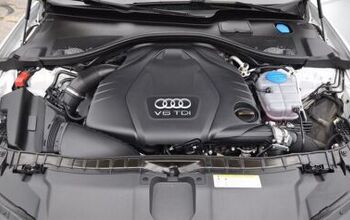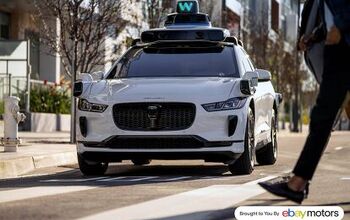U.S. Indicts Four Audi Managers for Diesel Deception

Four men tasked with developing a very dirty diesel engine for use in Audi vehicles have been indicted by a U.S. grand jury. The four, including the head of Audi’s Diesel Engine Development department, face charges of wire fraud, violation of the Clean Air Act, and conspiracy, all stemming from the development of an engine that didn’t have a chance of being certified in the U.S.
And, because they’re believed to be living in Germany, they’d best leave the U.S. off their list of vacation destinations.
The news came Thursday by way of Reuters. Facing charges (and arrest, should they ever land on U.S. soil) are managers Richard Bauder, Axel Eiser, Stefan Knirsch, and Carsten Nagel. Bauder was the group’s head.
Together, the men developed a 3.0-liter diesel V6 with an AdBlue tank too small to treat the exhaust emissions of a vehicle Audi hoped would go 10,000 miles between refills. It couldn’t, necessitating the use of an undeclared auxiliary emissions control device (defeat device) that would fool U.S. environmental regulators into believing the vehicle ran clean at all times. In actuality, the vehicle would only run clean and within the law while undergoing EPA testing.
According to the indictment, the men found themselves caught between Audi’s desire “for a large trunk and high-end sound system” and the need to satisfy regulators. Told by engineers that “Audi had to cheat to pass U.S. emissions tests,” the managers went to the dark side, installing a smaller AdBlue tank and equipping the engine with illicit software.
The same type of device was used with the automotive group’s 2.0-liter Volkswagen diesels. Eventually, the larger engine came to U.S. shores beneath the hood of the Audi Q7, Q5, A6, A7, A8, and VW Touareg models spanning the 2009 to 2015 model years.
The house of cards built in that engine shop came crashing down in September 2015 following independent U.S. testing at the urging of the International Council on Clean Transportation.
For a deep dive into the indictment, check out this piece in The Verge, in which it is revealed that a supervisor at Audi’s testing department attempted to head off disaster by confronting the men. Despite protests from engineers and others, the plan went ahead, even after it was surmised that the U.S. wouldn’t have much trouble catching them in the act.
With these latest indictments, the number of Volkswagen Group employees charged by U.S. authorities stands at 13. That group includes former VW CEO Martin Winterkorn, who remains in Germany. Ex Audi CEO Rupert Stadler, arrested last year in Germany, is not among them.
[Image: Volkswagen Group]

More by Steph Willems
Latest Car Reviews
Read moreLatest Product Reviews
Read moreRecent Comments
- Master Baiter I told my wife that rather than buying my 13YO son a car when he turns 16, we'd be better off just having him take Lyft everywhere he needs to go. She laughed off the idea, but between the cost of insurance and an extra vehicle, I'd wager that Lyft would be a cheaper option, and safer for the kid as well.
- Master Baiter Toyota and Honda have sufficient brand equity and manufacturing expertise that they could switch to producing EVs if and when they determine it's necessary based on market realities. If you know how to build cars, then designing one around an EV drive train is trivial for a company the size of Toyota or Honda. By waiting it out, these companies can take advantage of supply chains being developed around batteries and electric motors, while avoiding short term losses like Ford is experiencing. Regarding hybrids, personally I don't do enough city driving to warrant the expense and complexity of a system essentially designed to recover braking energy.
- Urlik You missed the point. The Feds haven’t changed child labor laws so it is still illegal under Federal law. No state has changed their law so that it goes against a Federal child labor hazardous order like working in a slaughter house either.
- Plaincraig 1975 Mercury Cougar with the 460 four barrel. My dad bought it new and removed all the pollution control stuff and did a lot of upgrades to the engine (450hp). I got to use it from 1986 to 1991 when I got my Eclipse GSX. The payments and insurance for a 3000GT were going to be too much. No tickets no accidents so far in my many years and miles.My sister learned on a 76 LTD with the 350 two barrel then a Ford Escort but she has tickets (speeding but she has contacts so they get dismissed or fine and no points) and accidents (none her fault)
- Namesakeone If I were the parent of a teenage daughter, I would want her in an H1 Hummer. It would be big enough to protect her in a crash, too big for her to afford the fuel (and thus keep her home), big enough to intimidate her in a parallel-parking situation (and thus keep her home), and the transmission tunnel would prevent backseat sex.If I were the parent of a teenage son, I would want him to have, for his first wheeled transportation...a ride-on lawnmower. For obvious reasons.


































Comments
Join the conversation
It doesn't appear that many car buyers care about this.
I wonder where that lone testing supervisor at Audi who dared speak up is buried career-wise. That managerial response is emblematic of top-down hierarchy companies.